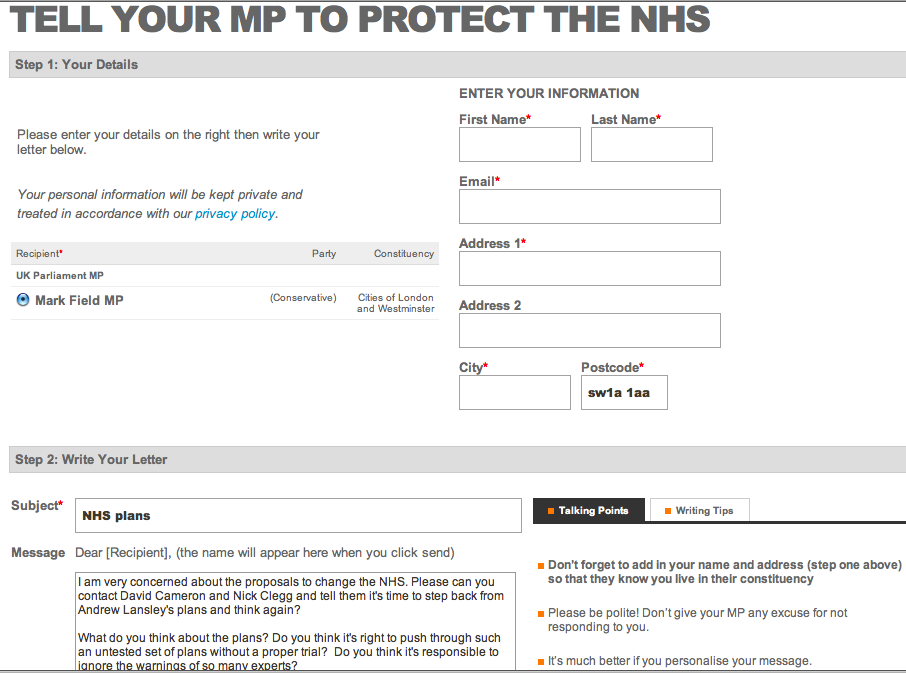Did no one else help? 38 degrees and claiming to play nicely with others.
 During the recent #ecfdebate, David Babbs of 38 degrees and I had a brief discussion about metrics, and I used the example of inclusion of organisations in their mailout as an example of 38 degrees focussing on the wrong thing. Micah White from Adbusters talked well about metrics, I talked about press releases and substantive content of messages.
During the recent #ecfdebate, David Babbs of 38 degrees and I had a brief discussion about metrics, and I used the example of inclusion of organisations in their mailout as an example of 38 degrees focussing on the wrong thing. Micah White from Adbusters talked well about metrics, I talked about press releases and substantive content of messages.
I repeated the question I asked on the ECF list: “Did no one else help?”
Micah’s point was that, when an organisation A/B test their emails for the most effective, the most clicks, is that the right metric? Should they A/B test on which headline most reflects the ethos of the community? Rather than a race to the most clicks, should it be a race to the most resonant with the beliefs, most likely to achieve the goals of the organisation (which probably isn’t “make our list bigger”). As with all answers, the most power goes to those who ask the questions.
That morphed into a response from David about my criticism of their relationship to other groups. Something I highlighted as an exemplar of the problem they currently trumpet.
Watch from 13:25 into this video where the discussion of email starts:
Here are the emails under discussion: I referred to the mail to the ECF list, and there was also the email to supporters. Assuming that David is not talking about different emails (I was talking about the 2 messages here) the links David claims to be there are to Sky News, Sky News Blogs, and The Guardian & The Independent. Those are not fellow campaigning organisations, unless 38degrees have a radically different understanding of what a campaigning (or media) organisation is. I’ve asked 38degrees for a clarification of their remarks.
On the up side, looking at their latest campaign, to “Tell your MP to Protect the NHS”, I notice a different mechanism for contacting your MP:
If you don’t particularly like the prewritten text in the form, press reload on the page, and you’ll get a letter with randomly different paragraphs in it. When I and others argued against the same prewritten text being sent to MPs, I’m not entirely sure that this was necessarily the solution in mind; and it might even be worse. But I’m glad they’ve sorted the more visible problems previously highlighted. If 38 degrees convince MPs that these aren’t prewritten emails, I’m not sure it will be any better for them when MPs catch on. I suspect they like being deceived far less than they like their time being explicitly wasted. It does however, back 38 degrees much further into a corner – after this action, it will be far harder for them to, credibly, claim that future letters are actually authored by consituents.
I share others’ concerns mentioned in the debate about the decision making process, and potential direction, of 38 degrees. As Tom Steinberg said in the debate, there is nothing intrinsic about the internet that promotes progressive issues – there’s currently a campaign countering GetUp’s Pokies campaign in Australia (GetUp being the Australian 38degrees). While the Guardian was for a long time the biggest UK newspaper online, now it’s the Daily Mail. But that’s a discussion for others to take up. What matters is that it’s an honest debate.
Where 38degrees lauded their decision making as made in hours, and compared with others who had a board meeting in 5 weeks time, sometimes consideration over time is good. And first reports are often wrong. I’d argue that the time taken for the substantive detail of the #march26 Fortnum & Mason’s arrests to come out was important. 38 degrees may have considered a petition in support on the Sunday morning, but it’s now that the www.fortnum145.org needs their support even more – but it’s not newsy now – they’re not interested. Not that they have to be, they choose what they campaign on, but they choose based on their own schedule.
Where David claims that his staff would function as a check on the will of “the community”, not only does this raise some potential concerns about the community, it also raises some potential concerns. The journey, since the 2010 election, of the Liberal Democrats and their relationship to some subsets of their supporters is an example here. That there are no organisational protection against this potential is a decision for their organisation; that there is no organisational acknowledgement that it’s a concern of others, is far more troubling.
I look forward to further debate.
(If I see a comment on this from David or anyone from 38 degrees here or elsewhere, I’ll add a link to it here).
 Disruptive Proactivity
Disruptive Proactivity